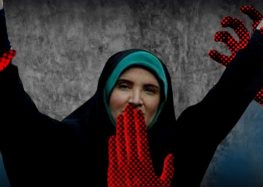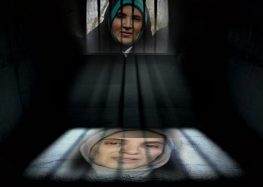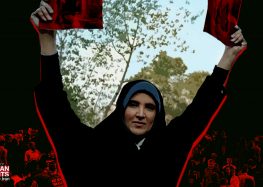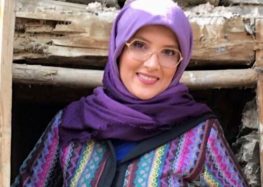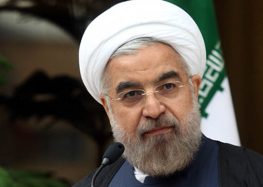Family Witnesses Reformist Political Activist Faint From Hunger Strike in Evin Prison
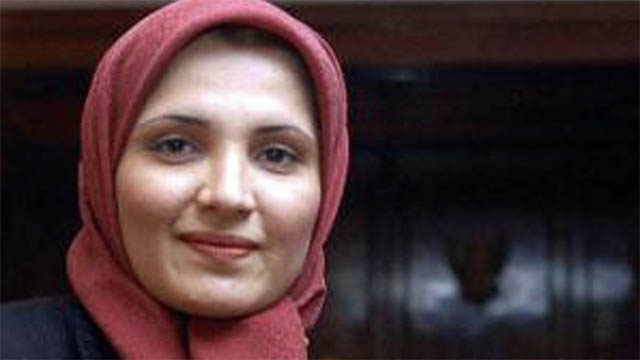
Hengameh Shahidi Held Without Charge or Legal Counsel Since March 2017
More than 50 days into her hunger strike in Evin Prison in Tehran, reformist political activist Hengameh Shahidi fainted in front of her family on May 4, 2017, the Center for Human Rights in Iran (CHRI).
Nahid Kermanshahi said her daughter, held in Ward 241 under the control of the judiciary’s security branch, has been refusing food since March 16 to protest her arrest the week before on undeclared charges.
“Her sister Bahar, her daughter Parmis and her son-in-law were also with me,” Kermanshahi told CHRI. “When the guards brought Hengameh, she looked very agitated. A female guard sat between us. Hengameh told her she had no right to sit between us. As they were arguing, I kissed my daughter to calm her down. Hengameh then shouted, ‘I don’t have a lawyer. Be my witness’ and passed out.’”
“No one brought a stretcher,” she said. “Parmis, Bahar and the son-in-law along with the prison guards carried Hengameh three or four floors up the stairs to the clinic. I was crying and beating on my head. We left and in the evening she called to say she was ok.”
Kermanshahi continued: “I don’t know what to do. My daughter has heart problems. She has kidney issues. I appeal to all the human rights groups and everyone who can help.”
“I saw my daughter passing out in front of my eyes,” she added. “Her jaws were clinched… My daughter is hungry. She’s on a strike. I don’t know what to do. Her life is in danger. She needs treatment.”
Shahidi, 41, was a journalist working for Norooz newspaper, published by the reformist Etemad Melli (National Trust) Party, until she became an advisor to the party’s leader and then-presidential candidate, Mehdi Karroubi, in 2009.
Karroubi, former presidential candidate Mir Hossein Mousavi, and Zahra Rahnavard have been under extrajudicial house arrest since 2011 for publicly disputing the result of the 2009 election.
“Every time I go to the prosecutor’s office, they refuse to tell me what Hengameh is charged with,” Kermanshahi told CHRI. “They say her interrogation has ended, but (her case) is still being processed.”
The court refused Shahidi’s lawyer of choice, Mostafa Tork Hamadani, claiming he didn’t have the proper credentials.
“I told the authorities to give me a list of acceptable lawyers so we could pick one, but they said she doesn’t need a lawyer,” said Kermanshahi. “But why? Why all this injustice?”
Based on Article 48 of Iran’s Criminal Code of Procedure (2015): “In the preliminary investigation stage of cases involving crimes against internal and external security, as well as organized crimes… both sides of the dispute can chose a lawyer or lawyers from a list approved by the judiciary chief.”
Kermanshahi told CHRI that her daughter continues to suffer in Evin Prison despite being moved to a different ward.
“After Hengameh was moved to Ward 241, she said she was being treated better compared to Ward 209 (under the control of the Intelligence Ministry),” she said. “They gave her books and she spent her time reading. But now she’s too weak to do anything.”
In a letter posted on her Instagram page on March 7—two days before her arrest—Shahidi predicted she would be targeted “as part of a project to arrest political activists and journalists before the presidential election on (May 19, 2017) so that the designated candidate (of hardliners) could be guaranteed a victory, just like in the 2009 election.”
Conservative President Mahmoud Ahmadinejad’s second-term victory in 2009 was widely disputed in Iran, including by then-candidates Karroubi and Mousavi, who encouraged the widespread peaceful protests against the declared result of the election that year.
On June 30, 2009, Shahidi was arrested for supporting the peaceful protests and sentenced to six years in prison for “propagating against the regime,” “acting against national security” and “insulting the president” by Judge Yahya Pirabbasi of Branch 26 of the Revolutionary Court.

